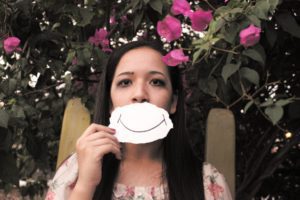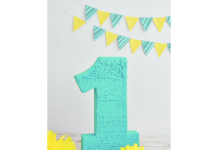
Let’s get real here. Being human is hard. Being a mom or a dad is hard. And we all face a variety of challenges on top of the general work/life balance game. Chronic illness, financial burdens, life-changing events — these are all things for which we openly seek help and advice. We support one another through these challenges because we talk about these challenges. But it’s harder to talk about mental illness, and therefore harder to support one another along the way. So let’s talk. It’s Mental Health Awareness Month, which seems as good a time as any to get this conversation going. I’ll start.
This last week has been an underwater week. Everything felt muted, slow, and a little suffocating. Even the good, beautiful, fun things. And it didn’t feel that way just because of the rain, or because of the busy-ness. Those reasons I could plan for or deal with accordingly. Instead, it’s because of a something I don’t openly talk about: depression.
There are days, weeks, and even months where I do a pretty great job of being a teacher and a mom and human being. And then there are the days when I don’t. Or rather, I can’t.
Last spring I was sitting on a friend’s front porch on a beautiful sunny day when she said, “You are about to fall off the edge.” And I wondered how she knew that’s how I was feeling right then, just barely holding it together enough to appear normal. She was actually referencing the fact that the back feet of my chair were dangerously close to landing me in the bushes behind me, but all the same, it opened a conversation for us about that feeling.
When my depression shows up and starts to take over, others may not even know. I still go to work, feed my kids, and get us all where we need to go. I can still go through the motions of adulthood. I can still have a conversation and say enough to get by and make the right faces in response, but not hear a word the other person is saying because it feels like I’m underwater. And when I walk away, I feel terrible for not remembering most of it.
Depression is being right on the edge of productive. It is having a full to do list and not starting any of them because they all seem impossible. It is trying not to feel bad about feeding my kids fast food again because I just can’t go to the grocery store or do more than make macaroni.
Depression is being on the edge of operational. It is going to bed with my kids at 8:30, not because it’s a choice or because I have to get up early, but because being awake means sitting in the empty, underwater feeling and being unable to change it. It is hoping that when I wake up I will feel normal again, even though that seems impossible.
Depression is being on the edge of friendship. It is getting calls and texts and invitations, but not responding because the thought of keeping up an ongoing conversation seems impossible. It is depending on those people who know to still be there.
Depression is being on the edge of happiness. It is having my kids ask what’s wrong and only being able to say, “I don’t know.” It is watching them do something amazing and wanting to join in or celebrate, but only going through the motions because my brain and body can’t get it together enough to actually engage. It is feeling bad that I can’t give them more.
But, depression doesn’t define me, and it doesn’t control me. With medication and some great cognitive behavioral therapy, with meditation and a great support system, I really am ok.
So why am I telling you my story? Two reasons, really. First, because I know I’m not the only one, and I know my case is not even as difficult as some others who suffer from the same or a similar illness. And to those of you whose lives are affected by this or another mental health diagnosis, I see you. You are not alone. And if you feel like you are, that’s the lie of the illness. And second, because it’s sometimes hard for those around us to get it, and hopefully this helps. And to you, our friends and family, thank you for trying to understand, for just listening, and for being patient. Talking about it openly allows me to strengthen my friendships and come back from the edge a little more quickly, because if it’s our tribes who help us to be pretty kick-ass most days, it’s also our tribes who keep us from falling off the edge on the hardest.
Being a mom is hard enough without the feeling of teetering on the edge all alone. If you need help, talk about it. Start with a friend or your primary care doctor, or try one of these resources:
https://nndc.org/resource-links/
http://www.mentalhealthamerica.net/depression-support-and-advocacy
https://www.mentalhealthamerica.net/finding-help
#EndTheStigma











Thanks for such an honest explanation of what depression feels like. Sharing stories is helpful to so many out there that feel like they are alone. I suffered pretty severe depression when my kids were younger and with the help of medication and therapy I found my way to a much happier place. Your story is spot on to what depression feels like. Thanks for sharing and always willing to be an ear for anyone that needs support.
You described so much of what I feel but I never thought of myself as depressed. I had my anxiety pretty well pegged but never considered that the two might be working in tandem. Such an eye opening piece for me… thank you!
Katie, I truly love and respect you for being brave enough to step forward and share your honest and thought provoking story of living with depression. One of the hardest parts of any mental illness is to own it, share it, and strive to rid the shame and stigma. People like yourself can make a difference for so many others who are not yet ready to share or open up for help, or maybe feel they have any hope, or place to turn. Thank you, Katie, for being the wonderful, beautiful woman and mother you are! I’m going to give you an extra big hug next time I see you, get ready ❤️
Katie, this is the first time I have read your blog. Thank-you so much for sharing. You were able to put into words feelings that I have most of my life but could not describe as eloquently as you did. My depression hit a new low when I lost my mom and had family issues at the same time. She was my sounding board, my biggest cheerleader, best friend, and glue that held my family together. Countless people came up to me after the time of her death reminding me that she was the sweetest, kindest person ever. People were so kind after the funeral…for a couple of weeks. And then I got the feeling that my response automatic response of “I’m ok” to the question how are you doing, people were annoyed with. If you don’t understand depression you can’t empathize, you can’t know what it feels like to be drowning with no water around. I felt like others thought my time was up on grieving and I needed to get over it already. I also sought help with medications, therapy, and TMS therapy which all helped some. The hardest part dealing with depression is momming. Putting on a happy face for my kids. My therapist tells me he wants me to cry but I’m scared if I start I can’t stop. When I do cry, my kids (3 and 5) tell me to stop, I think it scares them. I will always miss my mom terribly but I need to be the best mom that I can for her. Momming is hard!
Comments are closed.